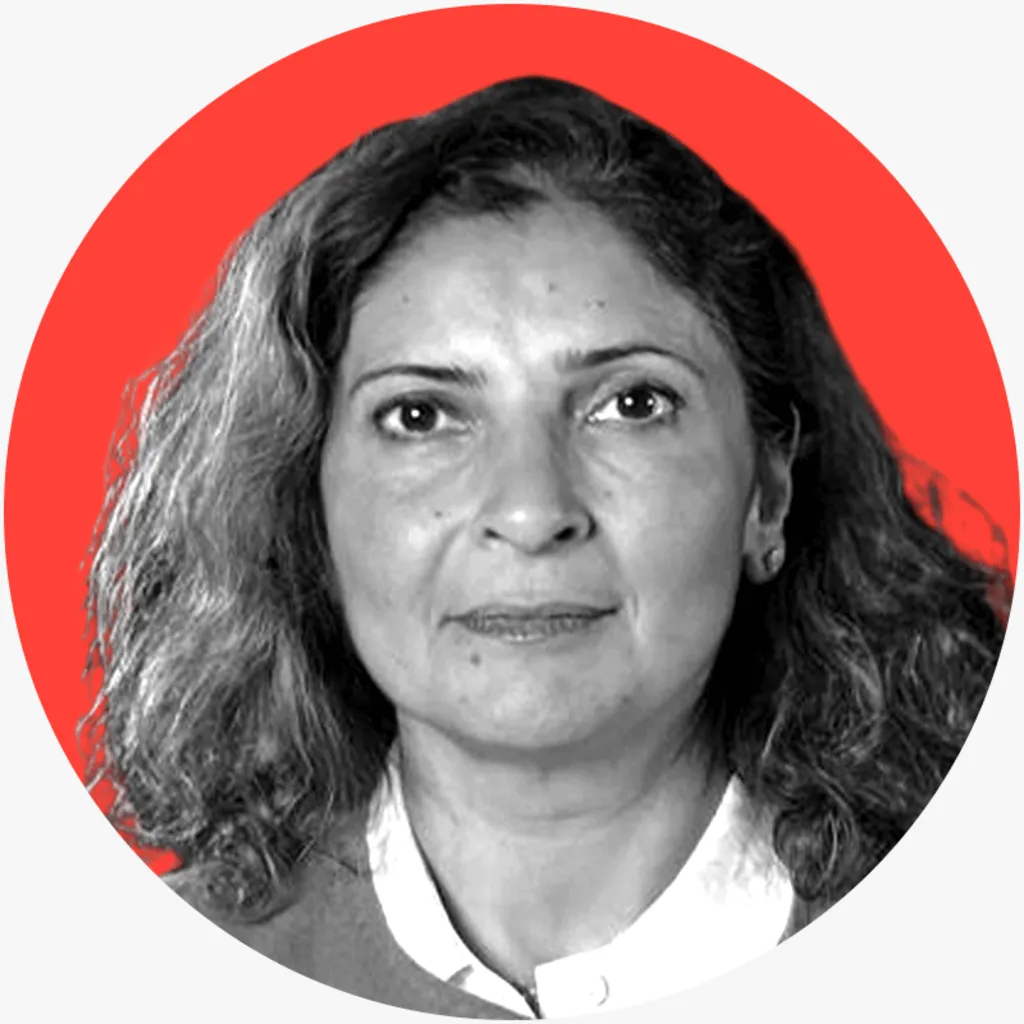

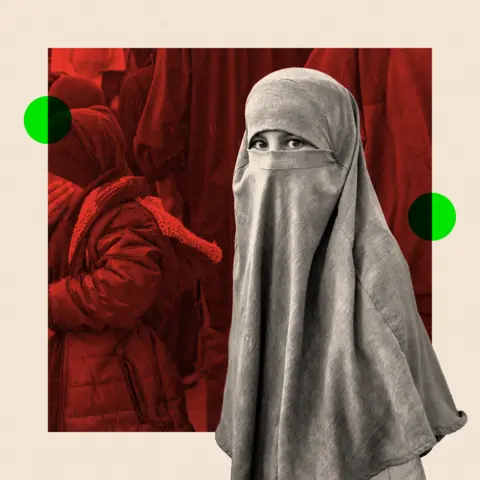 BBC
BBCOn the morning of 8 December 2024, I waited anxiously at the Lebanese border, hoping to get into Syria as soon as the crossing opened, not knowing what to expect.
Bashar al-Assad, the president of 24 years, was gone. Opposition fighters had advanced towards Damascus, taking major cities including Aleppo. I couldn't believe what I was seeing: Syria was free.
Like many Syrians, I'd only ever known the country under the rule of Assad and his father Hafez, who had been in power from 1971 until 2000. Life under the Assads had meant more than 50 years of disappearances, incarceration - and the civil war that began in 2011 had claimed the lives of hundreds of thousands of Syrians.
I'd been detained at the start of the uprising that year, and several times afterwards; I witnessed men lined up to be beaten and heard screams of torture. Even after I left the country in 2013, I learnt that security forces had broken into my apartment in Damascus and vandalised it.
I assumed I'd lost my home country for good, then suddenly last year the dictatorship was toppled in just over a week. As I crossed the border into the country without fear of arrest, and watched rebel fighters shoot celebratory gunfire, while people rejoiced on the streets, I felt like laughing and crying at once.
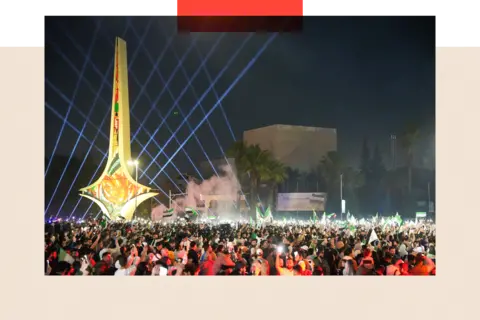 Getty Images
Getty ImagesFor weeks, Damascus's main Umayyad Square became a hub of celebrations. Young and old talked freely about politics and everywhere Syria's future was debated openly; among street vendors and taxi drivers, boys cleaning shoes. All of this was unthinkable under Assad, as Syrians could never protest freely for fear of reprisals.
Only now, four months on, the situation is more complex. Though great strides have been made in gaining some social freedoms, there are growing concerns around what democracy will look like but also around the role of Islam in the new regime.
So, how long might these social freedoms remain – or could, as some fear, the newly won liberties be short-lived?
At Rawda Café in central Damascus, just across the road from Parliament, intellectuals gather around long tables to smoke shisha and discuss culture. Under Assad, political activists were picked up and arrested there. Rumour had it that some waiters were regime informants.
Today, it's a very different picture. The café hosts talks and music plays. Prominent figures who once fled the country have returned too – many are greeted by a band playing traditional songs with a giant drum.
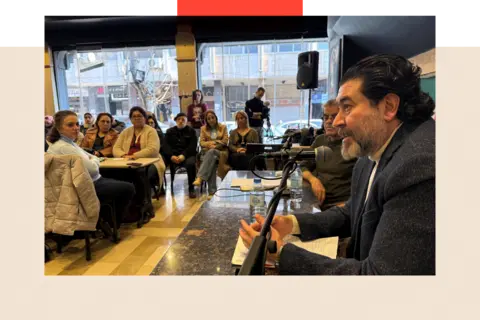
Syrian journalist Mohammad Ghannam is one of them. He tells me that he spent months in prisons during Assad's regime and later moved to France; his euphoria at returning is palpable.
"I think everyone who can come back, should come back to rebuild the country," he declares. "There is a window to do whatever you want now compared with before 8 December 2024."
Reflecting on the past, he adds: "Even preachers in the mosques needed to get approval and know what they were going to preach. [Now] it's completely free. [At] Friday prayers the Imam was talking about how your personal freedom shouldn't step on other people's freedom."
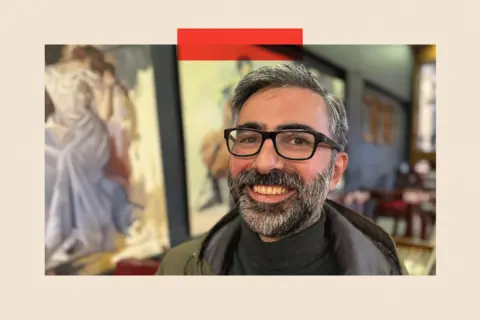
Odai al-Zobi has also recently returned to Syria after 14 years – he left to study but says he was unable to come back before now because he was outspoken about the regime.
"My books were banned here," he tells me. "Now there is no censorship, you can read whatever you want. I was very surprised that a lot of people want to read and want to know more."
"This is a big change," agrees Ali al-Atassi, a Syrian documentary-maker and son of former Syrian President Noureddine al-Atassi. (His father was deposed in a coup by Hafez al-Assad.)
"It changed the rules of the game, and opened a lot of perspectives for the country."
Syria's vibrant arts and culture scene has long been a source of the country's pride: the Assads supported it, wanting to present a rich culture to the world yet some artists and writers were killed for their views on the regime.
Even carrying certain books was once cause for arrest. Today, however, all kinds of books are on display in shops around the capital - even political titles. Cinema clubs screen films that were previously banned too.
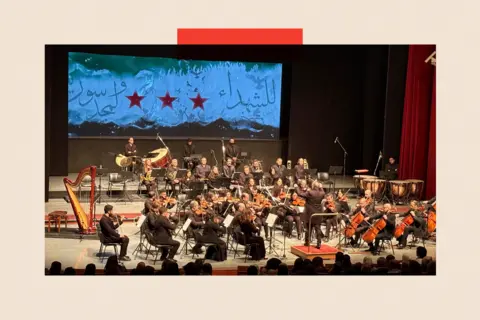
For weeks after Assad's fall, the caretaker government didn't appoint a Minister of Culture, but musicians and artists grouped together to protect the culture scene.
Now, however, there are fresh concerns: while Syria under Assad saw political debates repressed, some worry that repression by clerics could end up forbidding some forms of art seen as anti-religious.
There is no clear evidence of this. Dr Maher Al Sharaa, the brother of the interim president, has been seen at the city's Opera House with his family; Vivaldi was played by Syrian musicians. The family looked like any modern one who would go on a weekend for theatre.
And after the fall of Assad, a cultural event with talks about cinema, music, theatre and performances was held at Beit Farhi, a historic house in the heart of Damascus's Jewish quarter. An all-female orchestra played songs that praised revolutions and martyrs. Some in the audience were left in tears.
"It is great to have this opportunity to talk among us about how to protect and support the art scene in Syria," says Noura Murad, a choreographer.
Mr al-Atassi also chooses to be optimistic. "I believe the Syrians won't allow this regime to enter in their private lives, to create rules on how to behave in the public space."
When Syrian President Ahmed al-Sharaa, who led the rebel offensive that overthrew Assad, was appointed by a military council on 29 January, he delivered a speech in which he stressed that the priority was to "fill the power vacuum in a legitimate and legal way".
But months on, there is concern among some around the likelihood of building a lasting democracy. And there is no system in place to hold officials, including the president, accountable until a permanent constitution is adopted and elections are held.
"The past few months, the regime has not been ready to share power and allow other political and social forces to find their place in society," argues Mr Al-Atassi. "Without opening up the political arena to other forces, I don't think Sharaa can bring Syria back to the international community."
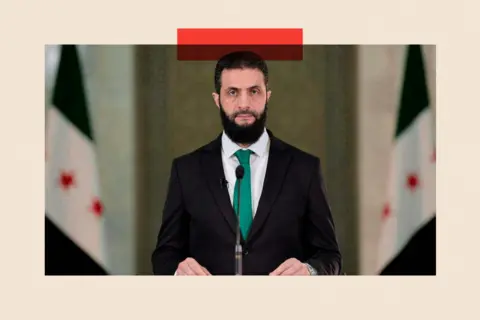 Getty Images
Getty ImagesIn February, hundreds gathered at the People's Palace in Damascus for a two-day national dialogue about Syria's future. Some critics argued that the meeting was organised in haste and was too short to cover all the key topics.
According to Abdulhay Sayed, a Syrian legal expert and managing partner at Sayed and Sayed law firm, it was neither representative nor truly reflective of consensus.
"Large segments of Syrian society felt excluded or unrepresented," he argues. "[It] was conceived as a mechanism to simulate wider assent."
However, he concedes: "It does reflect a certain willingness on the part of the new authorities to expand the scope of consultation."
Sharaa, who was leader of Hayat Tahrir al-Sham (HTS), the former al-Qaeda affiliate and Islamist group that dominated the rebel alliance, has clearly states his commitment to establishing a country with "free and impartial elections".
He has also appointed a committee to work on a constitutional declaration, which laid out Syria's future over a five-year transitional period. However, the subsequent declaration didn't enshrine the separation of powers.
"He needs to show that he's more serious about political participation from all groups," says Mr Al-Atassi.
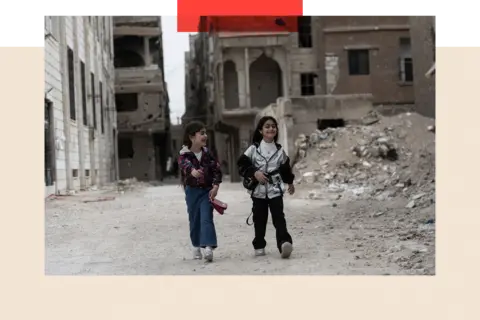 Getty Images
Getty ImagesThere are some examples of this: a Christian female minister was appointed minister for social affairs, while head of the White Helmet civil defence group, became minister of emergencies and disasters. But some have raised concerns about the appointment of Sharaa's brother as head of presidential affairs.
"High-ranking former HTS members now occupy key sovereign positions," says Mr Sayed.
Mr Al-Atassi also claims that "highly qualified people in international law were not asked to participate in the Cabinet. They were overlooked."
The Minister of Justice holds a degree in Sharia law (Islam's legal system, derived from the Quran), and is not an expert on Syria's Civil Code, which draws heavily on French and Ottoman law. One question being asked is whether codes based on Sharia law could be applied rather than civil ones.
"The new authorities have so far made no attempt to replace the existing legal codes with Sharia-inspired legislation," says Mr Sayed. However, he adds, "this remains an area we continue to monitor closely.
"The most pressing concern is whether judicial independence will be restored and effectively safeguarded. This represents a major challenge.
"There is little indication that the new authorities are genuinely committed to re-establishing an independent judiciary."
Under Assad's regime, women had relatively equal rights and had been represented in parliament since the 1950s, as well as being present in society at all levels. There are no new written rules that might point to how that could change – but there are some worrying signs.
Only one woman was appointed in the interim government. According to research by University College London and McGill University, women's rights advocates have raised concerns over HTS enforcing an interpretation of Islamic law, which could for example severely restrict women's mobility, dress and public participation.
"One important area to watch is whether women judges – who make up approximately 35 to 40 per cent of the judiciary – will face marginalisation or dismissal," says Mr Sayed. "So far, we have seen no signs of such a trend, but continued vigilance is essential."
As for religious freedoms, there have been no new laws or rulings restricting on social life, but some Syrians report that they have seen what appear to be attempts to enforce Islamic rule.
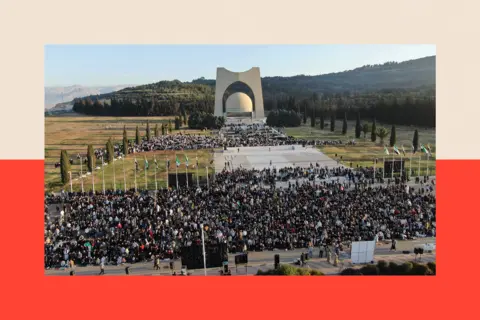 Getty Images
Getty ImagesThe Ministry of Justice has begun separating entry for men and women, plus there have been reports of men distributing flyers on buses and in Umayyad Mosque in Damascus asking women to wear full-faced veils.
In Christian neighbourhoods in the capital, cars have been filmed driving through the streets with preachers advocating for Islam over loudspeakers. An order to shut down bars and restaurants in the old city's Christian quarter was only revoked after a public outcry.
Some observers of Islam tell me they are worried. Damascus is known for its tolerance but there are fears in some quarters that the new authorities have a Salafi background (a strict, orthodox Sunni Muslim sect).
"There is an increasing call for a return to religious values," says Mr Sayed. "This presents a profound challenge for those who still believe in democracy, the rule of law, and equal citizenship."
However Husam Jazmati, a Syrian academic who researches Islamic movements at the civil society research organisation Impact, claims that Sharaa "opposes both Islamist and non-Islamist political movements [and] neither wants to establish an Islamic state nor believes it's possible.
"They don't want to, and they can't".
Even if the government wanted to instil hardline practices, the question is whether they could? Alaa El Din Al Sayyek, an imam based in Damascus, thinks not. He argues that Syrians would reject any attempt to do so.
"It is impossible, our society will not accept it," he tells me. "We have lived in harmony with different sects for years even during difficult times. The Quran says it clearly: no compulsion in religion."
Today there are growing tensions: violence in coastal cities has left more than 1,400 people dead, many of them Alawites (part of Assad's minority sect). They were said to be revenge for attacks on Syrian security forces.
Elsewhere, in the north east of the country, even though the Kurdish-led Syrian Democratic Forces (SDF) declared victory over IS in 2019, camps still hold about 56,000 people, many of them the family members of Islamic State group (IS) suspects, more than five years after the jihadists' territorial defeat in Syria.
The main question now facing the country, however, is how Syrians see their future. There are some tensions around this, which have seeped into a push-pull between the leadership and HTS, according to Mr Jazmati.
He claims that while Sharaa's top circle wants to build "a conservative, economically liberal" state, "they can't stop many of their members – those they've appointed in various positions and rely on because they're trusted – from trying to Islamise public life in Syria."
The think tank International Crisis Group has similar concerns. It has said that it believes Syria is living "on borrowed time".
"The interim government is running out of funds, security forces are overstretched, poverty is deepening and insurgency is brewing at the periphery. Outsiders are meddling. Western sanctions deprive leaders of what they need to rebuild, while preventing fragmentation or a return to civil war."
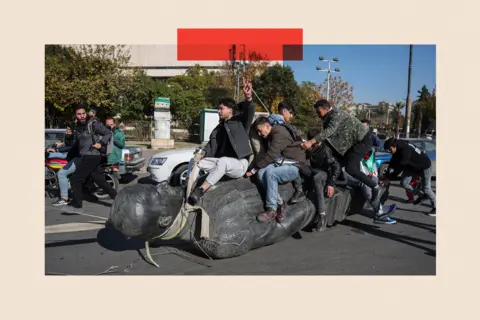 Getty Images
Getty ImagesFor Mr Al-Atassi, the solution is straightforward: He believes Sharaa needs to open up the political arena. "There are no elections today in Syria, there are only nominations," he says. "This is very dangerous."
With a pause, he adds: "It could be that a new dictatorship is in the making - but I don't believe that the Syrian people are ready, after five decades, to accept a new dictatorship."
And as for the prospect of lasting democracy? "We need to wait to see," he says. "But I'm not at all optimistic."
However there is a wider issue too. That is, could there be a wider loss of faith in the very idea of democracy given the country's recent history?
Mr Sayed thinks so. "Though the Assad-era constitutions formally proclaimed political freedoms… our experience of political modernity came in the form of shells falling on our heads, while our bodies were laid bare in detention camps," he tells me.
"Large segments of the Syrian population have lost faith in the promises of political modernity."
Of the many challenges facing the new leadership, perhaps it is this that they would be wise to address first as they continue to carve out a new path for the future of Syria.
Top picture credit: Getty Images
BBC InDepth is the home on the website and app for the best analysis, with fresh perspectives that challenge assumptions and deep reporting on the biggest issues of the day. And we showcase thought-provoking content from across BBC Sounds and iPlayer too. You can send us your feedback on the InDepth section by clicking on the button below.